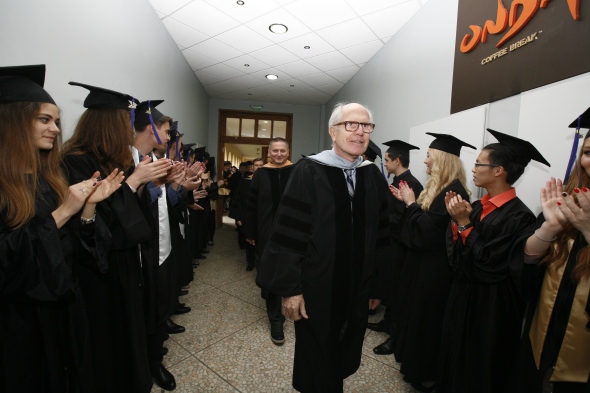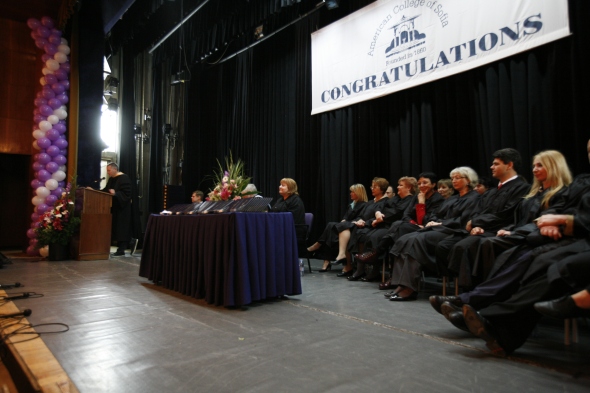Georgi Gospodinov: Never Stop Wondering
1May 26, 2016 by American College of Sofia
Georgi Gospodinov is the undisputed star of modern Bulgarian literature. With two books, Natural Novel and The Physics of Sadness, he successfully conquered not only the hearts of the reading public in this country but also book fairs worldwide. Apart from those two bestsellers, for the past 25 years Gospodinov has never stopped writing – essays, short stories, poetry – but in this case we invited him to speak. His speech is calm, wise, inspirational. It is an honor for the American College of Sofia that Georgi Gospodinov gratefully accepted to be the Commencement Speaker at the 2016 graduation ceremony.
Honorable Dr. Ewing, honorable Mr. Stimmler, esteemed Trustees, dear teachers, parents, friends,
Dear students from the Class of 2016,
You’re at the center of this day, and secretly I’ll say at the center of this century.
Thank you for the excitement to be with you. I am excited, I hope that you are excited too – the air between us is filled with excitement, and that is wonderful. Before it’s gone, let me whisper in your ear, hold on to this excitement, hide it in your pocket, hold it in your fist, and never let it go, in all the years that come from now on. If one day you sense that you don’t feel any excitement, immediately recall this afternoon. Recall it urgently, as an emergency, as a survival kit. One should not and cannot live without excitement.
I have been invited here to say a few words just because I’m a little older and, due to circumstances, have written a few books which, God knows how, have touched some people. Supposedly, everyone who speaks from here knows more about life and the world, and can share this knowledge, with the ease of someone selling lettuce and cucumbers at the market. Let me say from the start – I don’t know more about life than you do. And as time passes, I realize that what I used to know as a boy and have already forgotten, was the real knowledge, knowledge from the heart. Ever after throughout our lives, through books and experiences with others, we are actually trying to get back to the lost knowledge of childhood.

Nevertheless, I will try and list a few important, to me, fragile and elusive things that I have filtered like grains of sand over the years. I would be happy if they could serve you at the outset. We already mentioned the excitement. Fan it, care for it, take a little every time you get cold.
Curiosity about the world and about the person by our side is another golden grain of sand that gets so easily lost, and is so important. And it too is related to excitement. To put it simply, never stop wondering. It is no accident that “wonderment” and “wonder” share the same nucleus. Once we stop wondering about the world, the wonder is gone.
There is one more, a third thing, that seems important to me: empathy, shared experience, compassion. It is so simple and so important. I am certain that some of you here would get tearful upon seeing someone cry, would feel pain upon learning of a friend’s pain, would caress a frightened child. It’s a peculiar literacy of the heart.
Today you receive your graduation diplomas. Inside, it would say how good you are at literature, math, physics, history, chemistry… But there are a different kind, invisible diplomas. For them, excitement, wonderment and compassion, sensitivity and that literacy of the heart will matter. Nobody tests us, nobody teaches us these subjects specifically. Nobody but life itself. What I’m saying is that true learning begins now. And I don’t mean the universities where you will go in the fall.
A great deal of the things I’ve learned about life I have learned from books. Once I wrote that a reading person is beautiful. Even when there are dark circles under your eyes from reading, it is even more beautiful. We are talking, of course, of beauty in that sublime sense where it is not just esthetics but also ethics. I’ll say it again: read, be beautiful and meaningful. Go beautifully and meaningfully through your entire life.

When I was younger I used to read randomly, and there is certain charm in that. One never knows which book at the right moment would turn out to be personal to him. There may be 10-15 books that will remain important to us, but until we find them we’ll have to go through entire libraries. Read, purposefully or randomly. Read when you’re frightened or calm. When you’ve been turned away or you have turned away someone, in either case the pain is great. Words can comfort. They can hurt too, of course. Don’t be afraid of being hesitant, unsure, or of trying the taste of sorrow sometimes. People are made of that too. We are immersed in a culture of success that constantly urges us to show strength, confidence, to rush and win. I confess that some of the most important events of my life are those that never happened. The things that never happened, like the loves that never happened, sometimes last longer and sprout a different kind of knowledge.
I have failed many times, and it occurs to me now how really normal I have been in those instances. A man has the right to fail. Especially, when he is young and things can be fixed. It is part of the capital of youth, spend it well. I mean to say, try, try it now. Eliot, one of my favorite poets, said, “For us, there is only the trying. The rest is not our business.”
I have some favorite authors whom I like to reread like one steals spoonfuls of strawberry jam from a hidden jar. I won’t list them, you’ll discover them for yourselves. I shall conclude with one of them whom I heartily recommend. His name is Jorge Luis Borges, I’m sure you know him. He tells of the time he was in the desert with friends. He got an idea, bent down, took a handful of sand, took a few steps, then opened his hand and let the sand slip out. When they asked him what he was doing, he simply said, I’m changing the desert. Why am I telling this story here? Because you will have to change deserts. And because changing the desert can start with a handful of sand and a few steps.
And this is how one gets tempted – as I said “desert,” just one more short parable about the Bedouin who, while crossing the desert, would often stop not because the camels got tired (camels are very resilient creatures, as we know). The Bedouin do frequent stops in order to give their souls a chance to catch up. They know that the soul moves by its own speed, it is a bit slower and one has to stop and wait for it so that they don’t lose one another. That is what I want to tell you at the end: when you’re traveling and you’re changing the desert, stop from time to time, open a book or just stand in some afternoon and gaze at something, ponder or just daydream, as it were. Give your soul time to catch up.

Dear graduates, what else can I tell you on this late afternoon, except to wish us all here really to hold on to the excitement of this brief moment that we share together. The exciting moments in life are not endless. Let’s remember the clouds of this instant, the sky, the light of the afternoon and the silence between the words. Yes, this silence.
By the way, do you know that 8 minutes and 19 seconds is the time it takes light to get from the sun to Earth. And if one day, God forbid, the sun stops, we shall be granted an entire 8 minutes and 19 seconds while the light is still traveling, an entire 8 minutes for the most important things.
Thank you for the 7-8 minutes of our lives that we’ve spent together!
Translation and introduction: Georgi Iliev
[…] English version of Mr. Gospodinov’s keynote address here. […]
LikeLike